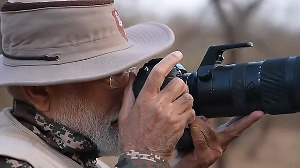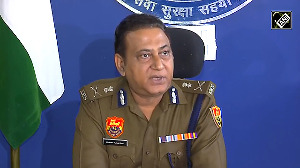 'In over 47 years as a journalist in Delhi I have never seen a Union Cabinet that is scared of the CBI, it has always been the other way.
'In over 47 years as a journalist in Delhi I have never seen a Union Cabinet that is scared of the CBI, it has always been the other way.
But whether by happenstance or through deliberate design, the CBI now has the Manmohan Singh ministry at its mercy,' reveals T V R Shenoy.
It is said that Lord Shiva once gave the demon Bhasmasura the boon that anyone on whom he placed his hand would be reduced to ashes. Finding nobody else in the vicinity -- he had been meditating in the wilderness -- Bhasmasura turned on Lord Shiva himself to test the efficacy of the boon.
The Congress has traditionally empowered the CBI to act against its foes. The abbreviation 'CBI' stands for 'Central Bureau of Investigation' but the ruling party's abuse of power means it could equally well stand for 'Congress's Bureau of Intimidation'.
Many think the raids against, say, a Y S Jaganmohan Reddy or an M K Stalin seem to prove this point. But there are officers in the CBI itself that are tired of this perception, and willing to do something about it.
It might have been the proverbial straw that broke the back when Union Law Minister Ashwani Kumar summoned the CBI to discuss its Coalgate report to the Supreme Court.
Going by the book requires integrity; breaking the rules requires absolutely no integrity, but requires a minimal amount of sly craft.
Most Indians have long since given up expecting morality from the Congress-led regime, but most also thought it possessed a certain amount of intellect.
Evidently, we were wrong. Which is why the Manmohan Singh ministry finds itself blackened by the Coal Scam today. Or, to be accurate, further blackened.
The background is easily told. Licences to mine coal were allotted arbitrarily. Dr Manmohan Singh held the Coal portfolio for part of the period. The Comptroller & Auditor General concluded that the lack of transparency had cost the public exchequer a loss of up to Rs 186,000 crore.
In September 2012 a public interest litigation was filed before the Supreme Court, and their lordships asked the CBI to investigate.
The Union law minister has every right to talk to the law officers -- the attorney general, the solicitor general, the additional solicitor general -- in the course of his duties. But the CBI does not fall within his purview; it reports to V Narayanasamy, minister of state in the prime minister's office. So, why would the Union law minister want to talk to the CBI director?
CBI Director Ranjit Sinha played by the book. The CBI took an appointment with the Union law minister for eleven o'clock on the scheduled date. The concerned files, regarding the statement to be made to the Supreme Court, were registered in the logbook (a government regulation that is occasionally ignored). The CBI director did not go alone to the Union law minister's office, but was accompanied by other officers.
Whether it was done deliberately or if the CBI decided to go strictly by the rules is a matter of opinion. The intent is moot; all that is relevant is that there is a clear trail from Ranjit Sinha's office to that of Ashwani Kumar.
Fans of the classic television series Yes, Prime Minister may recall Sir Humphrey Appleby's dictum that 'the ship of State is the only ship that leaks from the top'.
I have no idea how the news leaked -- UPA partners trying to embarrass the Congress, perhaps, or an unusually conscientious officer -- but rumours soon spread in Delhi. We know that talk of the meeting in the Union law minister's office made it to the media, did they also reach the august ears of their Lordships?
What is on record is that on March 12 the Supreme Court asked the law officers present whether the 'political executive' -- as opposed to the 'administrative' executive? -- had seen the CBI's report on the Coal Scam.
As Walter Scott wrote: 'Oh what a tangled web we weave/When first we practise to deceive!'
There were, reportedly, two law officers present when their Lordships posed the question. The additional solicitor general, completely innocently, denied that any such meeting had taken place between the CBI director and the Union law minister.
But the attorney general was also present. And the rumour mill has it that this law officer had also been there in the Union law minister's office when the CBI director arrived with his colleagues.
If the attorney general were there his silence in the Supreme Court suddenly becomes a very serious matter. What happens if the senior law officer misleads the Supreme Court, even by silence?
Their Lordships reportedly did not question the attorney general on that occasion. Instead, they asked the CBI director for an affidavit stating that there had been no interference by the political executive.
In over 47 years as a journalist in Delhi I have never seen a Union Cabinet that is scared of the CBI, it has always been the other way. But whether by happenstance or through deliberate design, the CBI now has the Manmohan Singh ministry at its mercy.
Parliament will reconvene for the second half of the Budget Session on Monday, April 22. The Opposition is sure to raise the issue, but the Congress can brazen it out.
The real day of judgment is Tuesday, April 30, when the CBI director puts his affidavit before the Supreme Court.
Ranjit Sinha, according to his colleagues, is a 'go-by-the-book' officer. If true, he will not deny that the Union law minister ordered a meeting to discuss the Coal Scam investigation. He cannot deny it in any case; the appointment books and log files will tell their own tale.
What exactly was discussed at the meeting?
The fact that files being taken out of the CBI office was registered in the logs suggests that a printed copy was taken to the Union law ministry. Did Ashwani Kumar, or anyone else present on the occasion, demand changes? If so, were notations made on the files? It is an important question because those written changes would be proof of political pressure.
The Union law minister -- possibly the attorney general too -- will be in the dock if the CBI director tells the Supreme Court that they met to discuss the Coal Scam probe. But the damage may not be limited there.
What happens if their Lordships ask the CBI to present both the report that it prepared on its own as well as the report carrying the changes, if any, suggested in that meeting with Ashwani Kumar? Those changes in themselves will point fingers.
I understand that Ashwani Kumar was himself summoned to a hush-hush meeting with the Congress's 'Core Group'. There, he apparently told his bosses that he had met the CBI director purely as a matter of 'routine'. This is simply not true; V Narayanasamy oversees the CBI, not Ashwani Kumar.
Or was the Union law minister suggesting that there is 'routine' interference in every CBI investigation?
Significantly, neither Ranjit Sinha nor any other CBI officer has denied that a meeting with Ashwani Kumar took place. The CBI director can testify that his men did not wilt under political pressure; he -- even assuming he wants to be helpful -- cannot deny that there was an attempt to apply such pressure.
As I wrote a few weeks ago, the Congress has a chance to declare a general election between May 11 (one day after the Budget Session ends) and July 25 (one day before the Monsoon Session starts). That would have given it a boost offered by its projected victory in Karnataka, where the results are expected on May 8 and where the BJP is expected to do poorly.
Ashwani Kumar's blatant interference -- at whose directive? -- may bring down the ministry a little sooner than expected, and with the stigma of Coalgate rather than the halo of Karnataka around the Congress.
'The cover-up,' goes a saying from the Watergate scandal 40 years ago, 'was worse than the crime.' The Congress should ponder over that.
An earthquake has just shaken Delhi. Tremors of another kind will shake Parliament come April 22. And the quakes emanating from the Supreme Court on April 30 could bring this ministry down much sooner than anticipated.
For more columns by T V R Shenoy, please click here.










 © 2025
© 2025